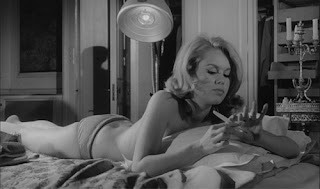"I don't believe in elitism. I don't think audience is this dumb person lower than me. I am the audience."
This famous quote from Quentin Tarantino was one of the inspirations for this blog. Growing up with his films as part of the so called "Tarantino Generation", I certainly respect him as director and even more so for his childlike enthusiasm for cinema. But while I do like his quote, it is far from the whole truth. The reality is more that - let's just face it - a huge part of the modern audience actually IS dumb - or at least they seem to leave their brains at the box office when they enter a Multiplex cinema. They want to temporarily escape from their miserable, boring lives and therefore demand light, superficial entertainment. There's an evident void and mainstream cinema tries to fill it. At least Tarantino does it in such an original way that he still reaches the cinephiles as well...
The big problem of this situation that it limits the potential of cinema as an art form. To make the point clearer, I would like to add another quote from Jean Cocteau, who embodied the artist as filmmaker like almost n one else:
"The public is comparable to a child who wants to be entertained at all costs. Stooping to their demands for facile pleasures would mean renouncing all ambitions to make of the cinema an art. You only need to look at the average radio program, to find a confirmation of this truth."
He said it in 1950 and it may be even more valid today then it was back then. The constant catering to audiences and the focus on cinema as entertainment after the success of the first blockbusters in the 1970s has forever damaged the perception of cinema. The public sees it as pure entertainment and among the majority of the establishment, cinema is considered a second-rate art form.
As far as the masses are concerned, their tastes can probably changed only to a certain extent. They are too influenced already by media and advertising. Unless the whole capitalist world order is going to change, chances are the latest Blockbuster or Julia Roberts vehicle will still hit it big at the box office. As I previously stated, most of the people on the street simply do not possess a particular sense for art - or style for that matter. Which brings me back to the elitist perspective. I fully believe that elitism is necessary - not only in cinema but also for society as a whole. The reason is that it is the enemy of mediocrity. We need independent thinkers who have own opinions, who are able to formulate new thoughts and not afraid of defending them against the masses. Only when cinema is taken seriously it can live up to its full potential as an art form. For me personally, it is not just that but the meta art, the sum of all arts.
That is where this blog comes into play. I want to
provide food for independent thinking and put films in the spotlight that - in my opinion - deserve more attention. Which doesn't mean that I won't review popular or bad films as well since it is actually more fun to dismiss a film than to praise it. By now you might ask yourself, why is he even qualified to judge that? Well, I don't want to go into too much detail here but after being obsessed with cinema since the age of 13, by now I see myself as someone who can appreciate "good" cinema and as someone who can see what others just can't. This bold self-perception may seem arrogant which is why I aptly gave this blog the name of the (German) term "Der Filmsnob"
That said, the blog - like most others - is highly personal and my reviews certainly reflect my personal taste and worldview. Sometimes even I am up for some cheap entertainment and I certainly do
NOT see myself as the godfather of films whose opinion is the only one that matters. Quite the contrary - I look forward to encouraging future discussions.
If you happen to live in or around the cinematic wasteland of Salzburg, Austria please do check out the website of my
film club and come by some time. After all, real life is still better than reel life (never mind what Truffaut said...)
Mit cineastischen Gruessen,
Der Filmsnob












